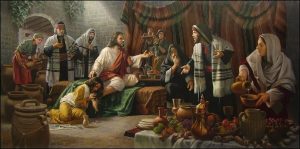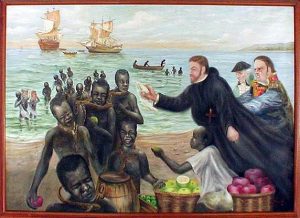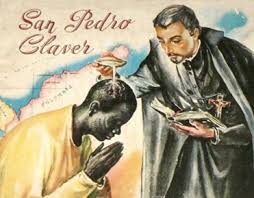Secure in Faith, Reaching Out in Love
(Col 1:21-23; Ps 54; Lk 6:1-5)
**********************************************
Have you seen the movie, March of the Penguins? If not, I would encourage you to do so.

That movie, along with the readings today, encourage us to be secure in faith and reach out in love.
In that charming and touching movie, we see how penguins, in the frigid cold near the south pole, stay warm. They huddle together and begin a gradual rotation, each penquin slowly moving out towards the periphery, so that no penguin is left exposed on the outside for too long. Eventually, each one gets a turn at being warm in the center before they brave the cold again so that other penguins can warm up.

That image of penguins surviving the cold can help us understand what St. Paul means when he talks about how we were once “alienated” or “estranged” from God and now are “reconciled” with God through Christ (Col 1:21-22). Paul reminds us that we were once outsiders, distant from God, but that Jesus became an outsider so that he could draw us in to be warmed by God’s loving presence. Or as St Paul also said, “Jesus became poor so that by his poverty we might become rich” (2 Cor 8:9).
Throughout his years of public ministry, Jesus went to the margins to tell outsiders that they had a place in his Father’s heart. He purposely sought out those who had been left out in the cold, whether it was because they were poor or Gentiles or branded as public sinners. In fact, he himself became like these outcasts. He grew up in a poor family. He ate and drank with sinners. He welcomed Gentiles and unbelievers alike. They were all part of his “chosen” people, and they felt a closeness to him that precious few of Israel’s righteous religious leaders ever knew.

Jesus with sinners
The reason Jesus could do this is because he was so secure in his identity as the beloved Son of the Father and in his intimate relationship with the Father. Jesus knew he was blessed by the Father, and that gave him the strength to not only reach out to sinners, but to even “sin” in the eyes of the religious leaders by breaking the Sabbath law. Jesus always put the law of love and mercy before the letter of the law. That led him to become the crucified victim, identifying totally with those judged unworthy by the official keepers of the law.
When questioned by the Pharisees, Jesus pointed to King David, a sinner who had experienced the Father’s unconditional love through repentance and forgiveness. That experience transformed David into the only true King that Israel ever had. That identity and relationship with God gave David the tenacity to overcome the rules around not eating the bread of the Presence. It was like David was saying, “I am king in the place of God, and if God was here right now, that is what God would do – use the bread of the Presence to feed my hungry men.”
The same applies to us. We have been loved unconditionally by the Father, blessed by the Father in baptism, filled with the Spirit of the Father in confirmation, and are members of the Body of Christ. We are no longer aliens, as St. Paul says, but citizens with the saints and members of the household of God.
So, whenever we feel like an outsider, remember Jesus, the ultimate outsider. He is with us, embracing us and guiding us to the warmth of our heavenly Father’s love. And remember the penguins too! Jesus placed himself on the outside to bring us in from the cold of sin and alienation. Now he is sending us to the margins, to the periphery as Pope Fancis puts it, to welcome other people in, especially those different from us.
And those other people will then go out and find more to bring in to the center. And so on and on, until the warmth of God’s love reaches every person in the world. It is a good thing there is plenty of room in God’s heart for everyone.
We have a great example of this message being lived in the saint we honor today, Peter Claver. He was born near Barcelona, Spain, in 1580 and joined the Jesuits in 1600. Inspired by St. Alphonsus Rodriguez, Peter was sent to Cartegena in South America, then the centre of the slave trade. There, Peter tended to newly arrived African slaves with food, water and medicine.

St Peter Claver ministering to slaves
Fr. Gerry LeStrat OMI has been to Cartegena where he saw the huge cement platform where the African slaves landed. They were taken to row upon row of concrete pens, just like cattle. What is especially tragic is that for the most part, the slave traders were Christians, probably Catholic, who found it, like the Pharisees, not that difficult to justify themselves in their dark activity.
Peter Claver would go to this area, force his way through this teeming, suffering humanity to find the sick and minister to them. He would find them on mats of broken pottery and bricks, and clothe those who were naked. Here is a quote from his writings:
“This is how we spoke to them, not with words but with our hands and our actions. And in fact, convinced as they were that they had been brought here to be eaten, any other language would have proved utterly useless. The we sat, or rather knelt, beside them and bathed their faces and bodies with wine. We made every effort to encourage them with friendly gestures and displayed in their presence the emotions that somehow naturally tend to hearten the sick.”

For nearly 40 years, he ministered tirelessly to the slaves, lobbied on their behalf and pleaded for He lobbied on their behalf and pleaded for more humane treatment for them. In 1654, ill and neglected by his religious brothers, Peter Claver died. He was canonized in 1888. He is a patron of Colombia and of all missions to black people.
The Eucharist is an experience of the Father’s unconditional love for us through the sacrifice of the life of the ultimate outsider, Jesus. May we learn a little from the penguins and above all, may our celebration grant us the strength and security to be like Jesus and Peter Claver, and reach out to the periphery with mercy and love.








